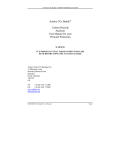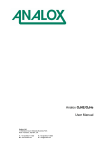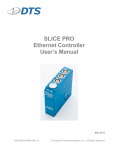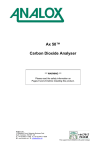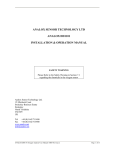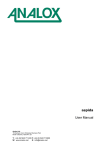Download Analox XDI Sensor/Transmitter User Manual
Transcript
Analox XDI Sensor/Transmitter User Manual Analox Sensor Technology Ltd. 15 Ellerbeck Court, Stokesley Business Park North Yorkshire, TS9 5PT, UK T: +44 (0)1642 711400 W: www.analox.net F: +44 (0)1642 713900 E: [email protected] Analox XDI Sensor/Transmitter – User Manual Contents 1 Introduction ...................................................................................................................................... 2 2 Health Warning ................................................................................................................................ 3 3 Installation........................................................................................................................................ 4 4 Basic Electrical Installation .............................................................................................................. 5 5 Hazardous Area Installation............................................................................................................. 6 6 Calibration........................................................................................................................................ 7 6.1 6.2 7 Calibration Equipment Requirements ................................................................................... 7 Calibration procedure ............................................................................................................ 7 Sensor Cell Replacement .............................................................................................................. 10 7.1 7.2 Sensor Cell Replacement Procedure .................................................................................. 10 Disposal of Discarded Cell .................................................................................................. 11 8 Disposal of Electrical and Electronic Equipment ........................................................................... 11 9 Specifications................................................................................................................................. 12 10 Replacement Cells/Accessories ................................................................................................. 13 11 Certification................................................................................................................................. 14 Document Ref: GDS-850-01 - June 2010 Page 1 Analox XDI Sensor/Transmitter – User Manual 1 Introduction The Analox XDI sensors/transmitters are constructed as complete integrated units using ‘state of the art’ electrochemical sensors together with the necessary electronic circuits to convert the tiny electrical signals from the sensor to an industry standard 2 wire, 4-20mA output. The sensor cell mounting is designed in such a way that cell replacement may easily be carried out simply and quickly. Models are available for the gases and ranges shown in Table 1. Table 1: Sensor types and ranges Gas Oxygen Carbon Monoxide Hydrogen Sulphide Sulphur Dioxide Nitrogen Dioxide Hydrogen Hydrogen Cyanide Nitric Oxide Hydrogen Chloride Ammonia Ethylene Oxide O2 CO H2S SO2 NO2 H2 HCN NO HCl NH3 C2H4O Sensor Electrochemical Electrochemical Electrochemical Electrochemical Electrochemical Electrochemical Electrochemical Electrochemical Electrochemical Electrochemical Electrochemical Ranges 0-25% 0-250ppm 0-50ppm 0-10ppm 0-10ppm 0-2000ppm 0-25ppm 0-100ppm 0-10ppm 0-10ppm 0-25ppm Document Ref: GDS-850-01 - June 2010 Page 2 Analox XDI Sensor/Transmitter – User Manual 2 Health Warning Sensor cells used in the XDI series contain an acid electrolyte. The sensors are shipped with the sensor cell already fitted. Replacement sensor cells are shipped in sealed packs. If there are any signs of chemical leakage from either the sensor assembly or from the replacement cells, use rubber gloves and wear chemical splash goggles to handle and clean up. Thoroughly rinse contaminated surfaces with water. Note the First Aid Procedures in Table 2 to be adopted in the event of contacting the sensor electrolyte if it accidentally leaks. Table 2: First aid procedures CONTACT TYPE EFFECT FIRST AID PROCEDURE Skin Acid electrolyte is corrosive. Skin contact could result in a chemical burn. Wash the affected parts with a lot of water and remove contaminated clothing. If stinging persists get medical attention. Ingestion Can be harmful or FATAL if swallowed Drink a lot of fresh water. Do not induce vomiting. Get medical attention immediately. Eye Contact can result in the permanent loss of sight Get medical help immediately and continue to wash with a lot of water for at least 15 minutes Document Ref: GDS-850-01 - June 2010 Page 3 Analox XDI Sensor/Transmitter – User Manual 3 Installation The enclosure must be fixed into position using the external fixing lugs provided. Under no circumstances must the enclosure be supported by way of any cable entry device. It is important that the cover is securely fitted to the body of the enclosure. The cover locking screw must be fully tightened down. Figure 1: Sensor Dimensions and mounting detail Note: All measurements in mm. Earth connection F1 Sensor Body The enclosure is fitted with an M5 external earth connection; a suitable ring type terminal lug must be used to secure the earth conductor. The F1 sensor body mounting thread must be fully engaged into the junction box. The sensor enclosure has 2 cable entries, 20mm 1.5mm pitch. All cable entries should be made using suitably certified glands. All unused gland ports should be sealed using appropriate certified stopping plugs. Document Ref: GDS-850-01 - June 2010 Page 4 Analox XDI Sensor/Transmitter – User Manual 4 Basic Electrical Installation This section merely describes the basic electrical installation of the sensor. To access the sensor internal electrical connections the enclosure lid grub screw should be loosened and the lid rotated anti-clockwise until the lid can be completely removed. The signal cable should enter the sensor/transmitter enclosure using the cable gland. Any cable connected to the sensor/transmitter should be of the screened, twisted pair type to ensure maximum protection from any external electrical noise. Ensure that the screen of the cable is connected to a suitable ground at only one end of the cable run (at the monitoring instrument end) to avoid unnecessary earth loops. The internal circuit is connected to the two cores and isolated from the metal case. Basic electrical connections are shown in Figure 2. Figure 2: Basic electrical connections INSTRUMENT SIGNAL LOAD RESISTOR 24V DC 0V 4-20mA loop Cable screen XDI SENSOR/TRANSMITTER Document Ref: GDS-850-01 - June 2010 Page 5 Analox XDI Sensor/Transmitter – User Manual 5 Hazardous Area Installation 1 Installation: The enclosure must be fixed into position using the external fixing lugs provided. Under no circumstances must the enclosure be supported by way of any cable entry device. It is important that the cover is securely fitted to the body of the enclosure. The cover locking screw must be fully tightened down. 2 Special conditions for safe use: (x) The unit should not be used as a safety related device in accordance with directive 94/9/EC. 3 T Ratings: The marking on the label on the cover must comply with the ambient temperature into which the enclosure is being installed. 4 Earthing: The enclosure is fitted with an M5 external earth connection; a suitable ring type terminal lug must be used to secure the earth conductor. The F1 sensor body mounting thread must be fully engaged into the junction box. 5 Maintenance: Periodic inspection of this equipment is necessary; refer to EN 60079-17 Clause 4.3 for guidance. Inspect the sinter disc at 6 monthly intervals to ensure it is clear and dust free. 6 The enclosure is intended for use under normal industrial conditions and must not be installed in an area where extreme vibration may occur. 7 This apparatus has been produced for use in a potentially explosive atmosphere. Before it is installed you must be aware of the requirements of BSEN60079, BSEN50014 and IEC61241. 8 All unused terminals must be fully tightened down prior to making live. 9 Do not open the Junction Box or remove the F1 sensor end cap when a hazardous gas atmosphere is present. 10 Before removing the end cap of the F1 sensor disconnect the power to the apparatus and wait 3 minutes allowing the sensor elements to cool. 11 The sensor end cap must be fully screwed into the body and the lock screw firmly tightened. 12 All cable entries should be made using suitably certified glands. 13 All unused gland ports should be sealed using appropriate certified stopping plugs. 14 Caution: The installation of this product must be carried out by suitably trained and qualified personnel only. We will not accept responsibility for any damage, injury or any form of loss due to products not being installed or used in strict accordance with these instructions. If in doubt, please contact Analox. 15 To maintain the certification, only manufacturers supplied spare parts should be used. See section 11 Certification for further details of Special Conditions for Safe Use Document Ref: GDS-850-01 - June 2010 Page 6 Analox XDI Sensor/Transmitter – User Manual 6 Calibration All XDI sensor/transmitters are calibrated before leaving the factory. If the sensor is being used with an Analox monitoring instrument then routine calibration may be carried out using the ‘ZERO’ and ‘CAL’ or ‘SPAN’ controls on the instrument. The same procedure applies to any other instrument which has similar adjustment available. If it is required to check or adjust the sensor/transmitter output current then the following calibration procedure should be performed. It should be noted that if during calibration it is not possible to achieve a satisfactory ‘SPAN’ adjustment then it is probable that the sensor cell has reached the end of its useful life and should be replaced. Refer to the sensor cell replacement Section. 6.1 Calibration Equipment Requirements The following items will be required to calibrate the sensor. • • • Flow Adapter Inert gas (eg Nitrogen or clean air) Certified Span gas (Note: Air cannot be used for oxygen sensors). The Span Gas is specific to the sensor being calibrated and of a concentration as near as possible to the range in which most measurements are to be made. For example, in the case of the Oxygen sensor/transmitter the range of the sensor is 25% O2, so a suitable span gas would typically be in the range 20-25% O2. 6.2 Calibration procedure 1) Loosen the lid grub screw and rotate the lid anti-clockwise until the lid can be completely removed and the internal electronics exposed. Grub Screw 2) Fit the calibration adaptor to the sensor head. Document Ref: GDS-850-01 - June 2010 Page 7 Analox XDI Sensor/Transmitter – User Manual 3) Purge the sensor with zero gas. Adjust the flow rate to between 150 and 300ml/min and wait about 5 minutes or until the reading is stable. 4) Connect a multi-meter set to measure millivolts (mV) betweenTP3 (+ve) and TP4 (-ve). The measured millivolt reading is the corresponding reading for the milliamp (mA) output of the sensor/transmitter. 5) Adjust RV4 to set the measured millivolts to 4.0mV. RV4 6) Purge the sensor with span gas. Adjust the flow rate to between 150 and 300ml/min and wait about 5 minutes or until the reading is stable. 7) Connect a multi-meter set to measure millivolts (mV) betweenTP3 (+ve) and TP4 (-ve). 8) Adjust RV3 until the measured millivolts agrees with the known concentration of the test gas (Refer to Example below). Document Ref: GDS-850-01 - June 2010 Page 8 Analox XDI Sensor/Transmitter – User Manual RV3 Example Assume a sensor has a range of 25% and that a Span Gas of 22% O2 concentration is to be used. The span current expected is calculated using the formula: Span Current = {(16 x Gas concentration) / Sensor range)} + 4 = {(16 x 22) / 25)} + 4 = 18.08 mA mA mA 9) Stop the gas flow and remove the calibration adaptor. 10) Refit the lid and tighten the grub screw. Document Ref: GDS-850-01 - June 2010 Page 9 Analox XDI Sensor/Transmitter – User Manual 7 Sensor Cell Replacement The expected operating life of most cells is varies. However, if the cell is constantly exposed to high doses of its specific gas, or gases to which it is cross sensitive then its life span will be reduced in proportion to the concentration/exposure time. It is a matter for the user to decide whether the cell is replaced automatically at a pre-determined interval, or if it is left until a time when it is no longer possible to calibrate. This will depend on the nature of the application. 7.1 Sensor Cell Replacement Procedure 1) Isolate the sensor from its loop power supply and wait 3 minutes before proceeding to allow any power stored in the sensor to dissipate. 2) Remove the sensor head grub screw using a 1mm Allen key. Grub Screw 3) Unscrew the sensor head cap. 4) Remove the old cell by gently pulling it from the housing. Document Ref: GDS-850-01 - June 2010 Page 10 Analox XDI Sensor/Transmitter – User Manual 5) Fit the new cell into the housing. Note the orientation of the sensor connector pins and housing connector sockets, the cell can only be fitted in the correct orientation. Sensor Pins Housing Sockets 6) Refit the sensor head cap. 7) Refit the sensor head grub screw. 8) Re-apply power to the sensor. Allow approximately one hour for the new cell to settle and then carry out the calibration procedure. 7.2 Disposal of Discarded Cell When the life of the sensor has expired or it is leaking or otherwise damaged it must be disposed of safely in accordance with local regulations. 8 Disposal of Electrical and Electronic Equipment According to WEEE regulation this electronic product can not be placed in household waste bins. Please check local regulations for information on the disposal of electronic products in your area. Document Ref: GDS-850-01 - June 2010 Page 11 Analox XDI Sensor/Transmitter – User Manual 9 Specifications Sensor Ranges Gas Response time (secs) T90 < 15 T90 < 30 T90 < 25 T90 < 25 T90 < 40 T90 < 90 T90 < 200 T90 < 45 T90 < 70 T90 < 60 T90 < 120 Expected Cell operating life* 2 Years in Air 2 Years in Air 2 Years in Air 2 Years in Air 2 Years in Air 2 Years in Air 2 Years in Air 2 Years in Air 2 Years in Air 2 Years in Air 2 Years in Air 0-25% Oxygen 0-250ppm Carbon Monoxide 0-50ppm Hydrogen Sulphide 0-10ppm Sulphur Dioxide 0-10ppm Nitrogen Dioxide 0-2000ppm Hydrogen 0-25ppm Hydrogen Cyanide 0-100ppm Nitric Oxide 0-10ppm Hydrogen Chloride 0-100ppm Ammonia 0-25ppm Ethylene Oxide Sensor Type Electrochemical Classification Certified flameproof ATEX / IECEx – Exd IIC T6 Gb CSA/US Class 1 Groups A, B, C, D ATEX SCS Cert No 03ATEX1176X CSA/US Cert No LR115863-1 IECEx SCS Cert No IECEx SIRO6.0016X UK Design patent No. 2025396 Housing Material Stainless Steel 316 S16 Weight 0.165 kg Cable Exit Mounting Thread 20mm 1.5mm pitch Accessory Mounting Thread 33mm 1.25mm pitch Lock Screw 3mm-1mm key Ingress Protection IP63 Approved sensor junction box Type XDI – EExd IIC T6 Material – aluminium alloy *If the cell is constantly exposed to high doses of its specific gas, or gases to which it is cross sensitive then its life span will be reduced in proportion to the concentration/exposure time Document Ref: GDS-850-01 - June 2010 Page 12 Analox XDI Sensor/Transmitter – User Manual 10 Replacement Cells/Accessories The following Replacement Cells/Accessories are available for the XDI series of sensors: Replacement Cells Part Number 9100-0410 9100-0420 9100-0430 9100-0440 9100-0450 9100-0460 9100-0480 9100-0490 9100-0500 9100-0510 9100-0530 Accessories Part Number 6000-0045 6000-0048 Description 0-25% Oxygen 0-250ppm Carbon Monoxide 0-50ppm Hydrogen Sulphide 0-10ppm Sulphur Dioxide 0-10ppm Nitrogen Dioxide 0-2000ppm Hydrogen 0-25ppm Hydrogen Cyanide 0-100ppm Nitric Oxide 0-10ppm Hydrogen Chloride 0-100ppm Ammonia 0-25ppm Ethylene Oxide Description Spare 20mm Port Plug EExd Stopping Plug F1 Flow Adaptor Document Ref: GDS-850-01 - June 2010 Page 13 Analox XDI Sensor/Transmitter – User Manual 11 Certification Document Ref: GDS-850-01 - June 2010 Page 14 Analox XDI Sensor/Transmitter – User Manual Document Ref: GDS-850-01 - June 2010 Page 15 Analox XDI Sensor/Transmitter – User Manual Document Ref: GDS-850-01 - June 2010 Page 16 Analox XDI Sensor/Transmitter – User Manual Document Ref: GDS-850-01 - June 2010 Page 17 Analox XDI Sensor/Transmitter – User Manual Document Ref: GDS-850-01 - June 2010 Page 18



















